My patients do not speak. Or rather, my patients do not speak using words. Instead, they have taught me the art of body language—of noises, expressions and postures.
I read the movement of ears, the way pupils dilate or constrict. Watch for the tremors, for the hunch of a spine, for the described bows or stretches that could indicate abdominal spasm. Search for the hint of a leg being favored, for the inaudible signs of pain. Wait for tongues darting over lips. Offer food that may be sniffed at or turned away from. I’ve learned to respond to fear with gentleness, to preempt the sharpness of tooth or claw with slow movements.
When I first became a vet, I thought that I’d be an animal doctor, but most days I feel more like a detective, unearthing the truth in my patients’ lab results and mumbled clues. My many years as an introvert—lonely years of listening more than talking—serve me well: I do not fear my patients’ lack of words. I understand that language can look like a lot of things. But my patients’ owners are sometimes skeptical of my translations.
Ms. Smith doesn’t know why her tiny blonde dog Lola won’t eat. She only knows that Lola’s vomit is tinged a pink that should exist only inside the body. Ms. Smith tells me of her confusion, seeing her companion suddenly quiet and withdrawn.
I ache to ask Lola where it hurts, trying meanwhile not to remember the many times I’ve had to convince a pet owner that pain does not always translate as screaming. Too often, owners walk in declaring that their grimacing pet is unhurt; or they don’t trust me enough to give their pet the medication I’ve prescribed.
In the end, I am alone with the life that nestles in my hands. I’m solely responsible, the translator of survival. So I become a cartographer of clues. Build puzzles out of the symptoms, the signalment, the days leading up to disease.
It would be easy if I had a picture to copy—a diagram with arrows indicating where the problems are. But each body is unique. A three-pound Yorkshire terrier and a 175-pound bull mastiff are the same, according to the textbooks; but in my hands they quiver, melt and unmerge—separate beings requiring individual approaches.
I cannot count on my textbook learning. (They didn’t tell us this when the books were overwhelming my classmates and me with information we had yet to acquire.) Some days I feel that I’m surviving on intuition. Call it the convergence of knowledge and experience; call it instinct. I follow my nose. Or my heart, or the thing that keeps me up at night. I ferret for sense amid the haze.
As I study a pet’s history and lab results, the abnormal factors are what stand out. I watch for them. Without these variations from the norm, I would not feel driven to keep stepping up to the challenge of my work. They are what make each day interesting, give this career a kind of turbulence that leaves me craving more.
I used to think that I wanted to leave all this behind—but lately I feel confident in my own hands. In my own brain. In the diagnostic process that I know I can follow. Step by step. Differential by differential.
Sometimes all I can do is work down the list, crossing out the possibilities, hoping for an answer among the options. Today, for instance, I learn from Ms. Smith that Lola eats berries in the garden—berries that irritate the bowels. An explanation! Today, I can make her feel better.
Individualities matter in people, too. Some owners need reassuring. Some need firm guidance. I have learned to explain medicine in the simplest terms. To describe the body and its inner workings to a child. To communicate first before attempting diagnostics or treatment.
This is the most important part of my job. Ms. Smith needs reassurance that she is not to blame. The berries weren’t offered in a bowl, but scavenged unseen. She needs the comfort of hearing me say, “Lola will be okay.”
There is so much that I didn’t know I’d have to become to get through the day. Health care is a product that I’m selling. It shouldn’t have to be, but it is. If my patient’s owner doesn’t believe that something is wrong, and if they don’t trust that I can discover what it is and help to fix it, then it doesn’t matter how smart and deft a clinician I am. If I can’t be enough of a showman to persuade, then I will not receive permission to go on. I can only save the patient if they let me.
So, like my patients, I learn to speak with more than words. I learn to mime, to move, to mold the air with my gestures. To read the emotions in the room, the hidden reasons that will not be named. To give everything, and then give some more.
Sometimes this is enough. Sometimes I commune with the creatures in my care. Some days I walk away emptied by a disease I cannot cure or by my unsuccessful efforts to gain an owner’s trust. Some days even my best advocating is not enough, and the creature goes home untreated, left to suffer another tomorrow.
Sometimes money holds health hostage. It is a fact that medicine costs money—treating, diagnosing and saving lives costs money. Even if this creature I have to save is not human, it still costs money.
There are other costs, too. To some, a dog is just a dog: They will spend a fortune on a holiday, but refuse to spend a penny on their pet. Many cannot believe that medicine for an animal costs money at all. The inconsistencies in perceived value are what cost this profession its peace of mind. Leaving minds in pieces, and veterinarians driven to despair. Driven to depart. Driven to find an alternative way to live—or not.
Sometimes, too, love gets in the way. An owner’s love can blind them to the clinical truth that I can see clearly. Death, inevitable, comes sooner than we’re willing to accept. But Lola will not face that prospect today. Tomorrow Ms. Smith will call to say that Lola is so much better—she is eating again, barking at the birds!
Today is a win.
I came here to make a difference. I cannot be unchanged by this work. I should not be unchanged. On days when I cannot find the good in the world, I will find it in the puppy who loves. I will find compassion for the person holding onto the memory of a dead mother through her suffering old cat. I will find forgiveness for my own limits, my inability to feel it all—their pain, their grief. I will be made and remade.
Once a dreamer; now, instead, practical. A realist.
Once an introvert, now confident in speaking to people. Firm in my belief that I will do what’s right, for my patient and for their family.
I will leave this profession a different person than I was when I began.

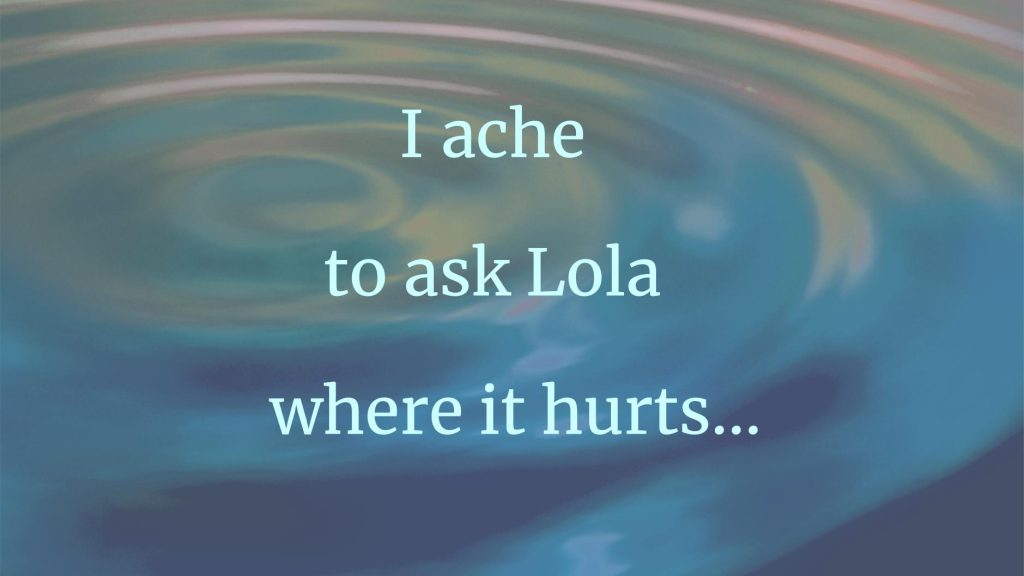
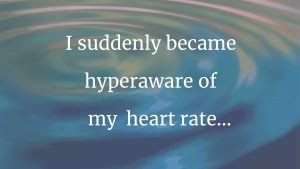
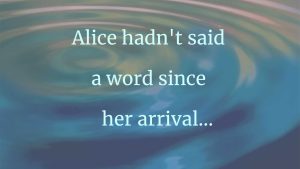
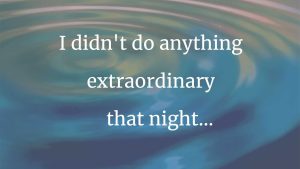
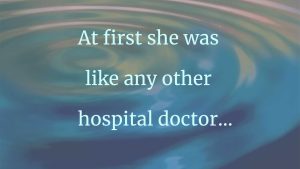
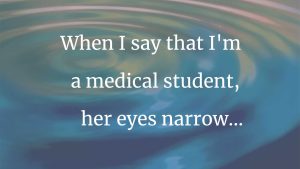
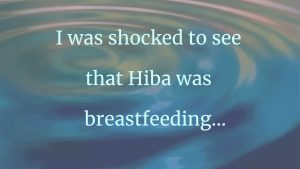
6 thoughts on “The Difference”
You are an amazing vet and person. Physicians of people, not pets, could learn a lot from you about communication and compassion. I wish you well as you continue to serve animals and their owners.
Your story is amazing. It’s only 1130, but I think you have made my day. Your ability to look into the lives of pets and their owners can’t be learned from a book. Before retirement I was a pediatric nurse practitioner. I think it takes awhile for us as providers to realize the importance of intuition. And sometimes the best we can do is lead by our intuition and our hearts. Thank you for brightening my day.
I have vivid memories of the times vets have read the room with me and my little family, and torment from the times they haven’t. When my gut spoke to the fact something was off and to question them, the experts. The work you describe is far more than detective doctoring, it’s true. An emotional marathon, that I’m sure so many people are grateful they get to run with you leading, guiding, assessing. Always supporting the knowledge that they can keep
moving forward. Beautiful essay Melissa
I work with neonates, one who just passed away suddenly after 6 weeks of care and we thought was out of the woods. I too look for clues. It too is too expensive for the families. I too try to break down the complex things to ways to be understood to get buy in from families. Thanks for writing this. I resonate with it.
Thank you for sharing. I was blessed to care caring veterinarians to help me learn (so much) and help my sweet dogs live the best lives I could give them. I’m a retired family doctor and the need to rely on intuition is so critical to any field of medical care. Thank you for your devotion and “listening “ to your patients
Such a powerful, poetic story. I was fortunate to have the same vet for 30 years, and she always seemed to know how my aging cats were doing before their labs came back.